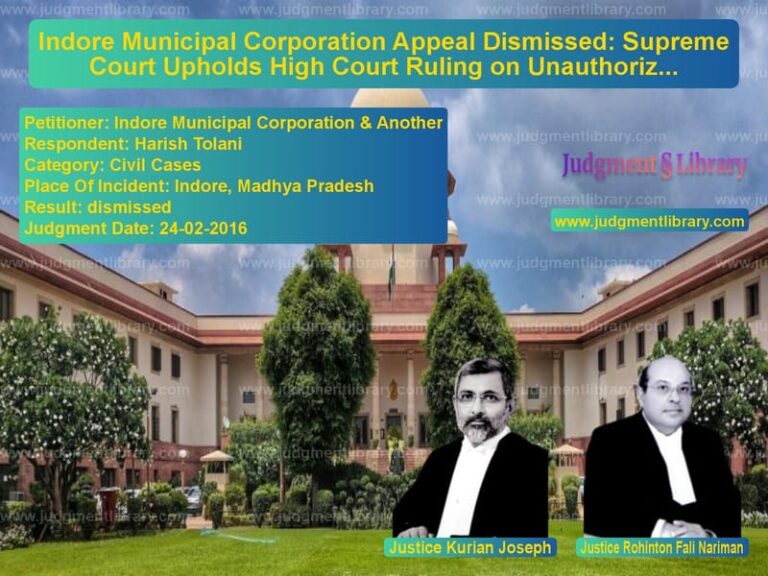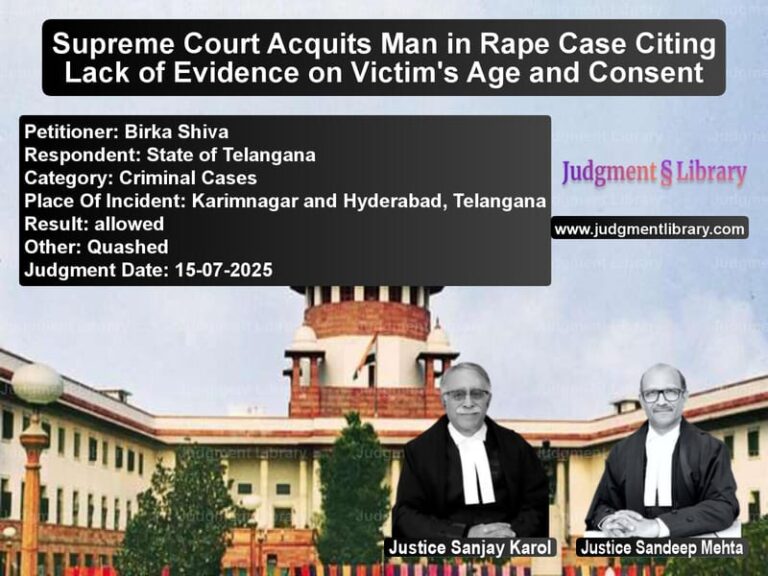CBI vs. Jagat Ram: Bribery Conviction and High Court’s Reversal
The case of Central Bureau of Investigation (CBI) vs. Jagat Ram is a significant judgment concerning corruption charges under the Prevention of Corruption Act, 1988. The case primarily deals with the procedural lapses in sanctioning prosecution and its impact on criminal proceedings.
In this case, the Central Bureau of Investigation (CBI) initiated proceedings against the respondent, Jagat Ram, for allegedly accepting a bribe. The trial court convicted him under Sections 7 and 13(1)(d) read with Section 13(2) of the Prevention of Corruption Act, sentencing him to two years of rigorous imprisonment along with a fine of Rs. 1000.
Background of the Case
The case dates back to December 2, 1994, when the CBI registered an FIR based on a complaint alleging that the respondent demanded an illegal bribe. Following an investigative procedure, a trap was arranged to catch the accused in the act. The trap was successful, as the accused was found accepting a bribe, confirmed through a phenolphthalein and sodium bicarbonate test.
Subsequently, the case was brought before the Special Judge, Chandigarh, where the prosecution presented its evidence. The trial court, upon evaluating the evidence, convicted the accused and imposed a sentence.
Punjab and Haryana High Court’s Decision
The accused, Jagat Ram, appealed against his conviction in the Punjab and Haryana High Court. The High Court meticulously examined the evidence and acknowledged that the demand and acceptance of the bribe were sufficiently proven.
“I agree with the findings of the fact which are based on evidence and, therefore, I hold that the prosecution proved the demand and acceptance. The defence failed to rebut the prosecution evidence. Presumption arises under Section 20 of the Act regarding acceptance of money.”
Despite agreeing with the trial court’s findings on demand and acceptance, the High Court identified procedural irregularities in the sanctioning process, particularly regarding the authority that granted sanction for prosecution. The court found that the prosecution had failed to examine an official who had actually applied their mind while granting the sanction.
Legal Issues Before the Supreme Court
Following the High Court’s decision, the CBI challenged the acquittal before the Supreme Court. The primary legal issue before the apex court was whether an irregularity in the sanctioning process could lead to the reversal of a conviction when the prosecution had otherwise proven the charges beyond reasonable doubt.
The court analyzed Section 19 of the Prevention of Corruption Act, which mandates prior sanction for prosecuting a public servant. It states that no court shall take cognizance of offenses under Sections 7, 10, 11, 13, and 15 of the Act unless prior sanction is granted.
However, the Act also provides that an error, omission, or irregularity in the sanction is not fatal unless it has resulted in a failure of justice. The Supreme Court observed:
“Failure of justice would be relatable to error, omission, or irregularity in the grant of sanction. However, a mere error, omission, or irregularity in sanction is not considered fatal unless it has resulted in the failure of justice.”
Supreme Court’s Analysis
The Supreme Court examined various judicial precedents on the matter, including C.B.I v. Ashok Kumar Aggarwal, where the court held that procedural lapses in sanction should not automatically lead to acquittal unless they cause substantial injustice.
The court also referenced the decision in State of Bihar v. Rajmangal Ram, where it was emphasized that the requirement of sanction is intended to protect honest public servants from frivolous prosecutions while not becoming a shield for corrupt officials.
The Supreme Court noted that the High Court had not adequately considered the fact that the accused had been caught red-handed and that the procedural lapse did not materially affect the case. The judgment emphasized:
“There would be ‘failure of justice’ not only by unjust conviction but also by acquittal of the guilty as a result of unjust or negligent failure to produce requisite evidence.”
Final Judgment
The Supreme Court ultimately ruled in favor of the CBI and set aside the High Court’s decision to acquit the accused. The matter was remanded to the High Court to reconsider the question of legality of sanction under Section 19 of the Act.
The court reiterated the importance of procedural compliance but also stressed that such lapses should not become a loophole for offenders to escape justice.
This judgment reinforces the significance of upholding due process while ensuring that procedural lapses do not undermine substantive justice.
Petitioner Name: Central Bureau of Investigation.Respondent Name: Jagat Ram.Judgment By: Justice Pamidighantam Sri Narasimha.Place Of Incident: Chandigarh.Judgment Date: 02-12-2024.
Don’t miss out on the full details! Download the complete judgment in PDF format below and gain valuable insights instantly!
Download Judgment: central-bureau-of-in-vs-jagat-ram-supreme-court-of-india-judgment-dated-02-12-2024.pdf
Directly Download Judgment: Directly download this Judgment
See all petitions in Fraud and Forgery
See all petitions in Bail and Anticipatory Bail
See all petitions in Judgment by P.S. Narasimha
See all petitions in dismissed
See all petitions in supreme court of India judgments December 2024
See all petitions in 2024 judgments
See all posts in Criminal Cases Category
See all allowed petitions in Criminal Cases Category
See all Dismissed petitions in Criminal Cases Category
See all partially allowed petitions in Criminal Cases Category







